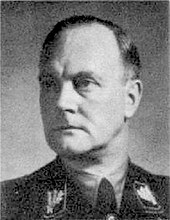Theo Berkelmann
Theo Berkelmann , maiden name Theodor Friedrich Wilhelm Hermann Berkelmann (born April 17, 1894 in Le Ban-Saint-Martin , † December 28, 1943 in Posen ) was a German politician ( NSDAP ), SS-Obergruppenführer and general of the police .
Life
Berkelmann was the son of a customs officer. He finished his school career at the Oberrealschule in Colmar , where he passed the matriculation examination in 1913. In October 1913 he joined the 11th Jäger Battalion as a one-year-old volunteer and from August 1914 took part in the First World War as a soldier, most recently in the rank of first lieutenant . After the war ended, he joined the Hülsen Freikorps in March 1919 , which was disbanded in 1920. After a short period of unemployment, he worked as a miner until the end of 1922 and then in the commercial sector and for insurance until 1926. From 1926 to 1930 he was employed in Upper Silesia as a sports teacher for the State Rifle Association. From early February 1930 to early March 1931 he was a farm worker in Canada .
At the beginning of May 1929 Berkelmann became a member of the NSDAP ( membership number 128.245), in March 1931 also the SS (SS number 6.019), from which he was immediately commissioned to draw up the SS Standard 23 "Upper Silesia". On 15 June 1931 he was the SA banner leader in the Supreme SA Command added, and as a teacher and deputy head of the Reich Leadership School of SA to Munich commanded.
On March 6, 1932, he returned to the SS and became adjutant to the Reichsführer SS , Heinrich Himmler . From October 1, 1932 to April 1, 1933, he was a staff leader in the SS group "North" in Altona . Then he took over the leadership of SS-Standarte 24 "Ostfriesland". On December 9, 1933, he was appointed leader of SS Section VI “Southeast” in Breslau and on April 1, 1936 as leader of SS Upper Section 11 “Elbe” in Dresden . At the same time, Berkelmann was promoted several times in the SS: on January 30, 1934 to SS-Oberführer , on September 9, 1934 to SS-Brigadführer , on September 13, 1936 to SS-Gruppenführer and on January 30, 1942 to SS-Obergruppenführer.
From June 1938 to April 1940 Berkelmann was Higher SS and Police Leader Elbe with his seat in Dresden and then took on representation duties. From 1940 he was employed as Higher SS and Police Leader at the Reich Commissioner for the Saar Palatinate and head of civil administration in Lorraine . In November 1943 he moved to the Reichsgau Wartheland in the same position .
From March 1936 until his death he was a member of the Reichstag . Berkelmann succumbed to on December 28, 1943 of cancer .
Awards
- Iron Cross (1914) 2nd and 1st class
- Golden party badge of the NSDAP on January 30, 1939
- War Merit Cross (1939) 2nd and 1st class with swords
- Honorary sword of the Reichsführer SS
- SS skull ring
literature
- Ruth Bettina Birn : The Higher SS and Police Leaders. Himmler's representative in the Reich and in the occupied territories. Droste Verlag, Düsseldorf, 1986. ISBN 3-7700-0710-7 .
- Joachim Lilla , Martin Döring, Andreas Schulz: extras in uniform. The members of the Reichstag 1933–1945. A biographical manual. Including the ethnic and National Socialist members of the Reichstag from May 1924. Droste, Düsseldorf 2004, ISBN 3-7700-5254-4 .
- Joachim Lilla: Senior administrative officials and functionaries in Westphalia and Lippe (1918–1945 / 46): Biographisches Handbuch. Aschendorff, Münster 2004, ISBN 978-3-402-06799-4 , pp. 119f.
Web links
- Biography of Theo Berkelmann based on Saarland biographies
- Entry on Theo Berkelmann in the Rhineland-Palatinate personal database
- Theo Berkelmann in the database of members of the Reichstag
- Theodor Berkelmann on the Internet portal Westphalian History
Individual evidence
- ^ Klaus D. Patzwall : The Golden Party Badge and its honorary awards 1934-1944. Studies of the history of awards Volume 4. Verlag Klaus D. Patzwall, Norderstedt 2004, ISBN 3-931533-50-6 , p. 64.
| personal data | |
|---|---|
| SURNAME | Berkelmann, Theo |
| ALTERNATIVE NAMES | Berkelmann, Theodor Friedrich Wilhelm Hermann (full name) |
| BRIEF DESCRIPTION | German politician (NSDAP), MdR and SS-Obergruppenführer |
| DATE OF BIRTH | April 17, 1894 |
| PLACE OF BIRTH | Le Ban-Saint-Martin near Metz |
| DATE OF DEATH | December 28, 1943 |
| Place of death | Poses |
